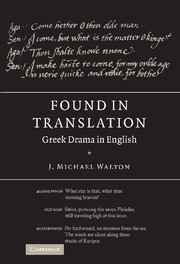Book contents
- Frontmatter
- Contents
- Acknowledgements
- Introduction: ‘Summon the Presbyterians’
- 1 Finding Principles, Finding a Theory
- 2 Historical Perspectives: Lumley to Lennox
- 3 Aeschylus and the Agamemnon: Gilding the Lily
- 4 Translating the Mask: the Non-Verbal Language
- 5 Sophocles' Oedipus Tyrannus: Words and Concepts
- 6 Text and Subtext: From Bad to Verse
- 7 Euripides' Medea and Alcestis: From Sex to Sentiment
- 8 The Comic Tradition
- 9 Modernising Comedy
- 10 When is a Translation Not a Translation?
- Appendix: A Comprehensive List of all Greek Plays in English Translation
- Notes
- Select Bibliography
- Index of Translators
- General Index
2 - Historical Perspectives: Lumley to Lennox
Published online by Cambridge University Press: 04 December 2009
- Frontmatter
- Contents
- Acknowledgements
- Introduction: ‘Summon the Presbyterians’
- 1 Finding Principles, Finding a Theory
- 2 Historical Perspectives: Lumley to Lennox
- 3 Aeschylus and the Agamemnon: Gilding the Lily
- 4 Translating the Mask: the Non-Verbal Language
- 5 Sophocles' Oedipus Tyrannus: Words and Concepts
- 6 Text and Subtext: From Bad to Verse
- 7 Euripides' Medea and Alcestis: From Sex to Sentiment
- 8 The Comic Tradition
- 9 Modernising Comedy
- 10 When is a Translation Not a Translation?
- Appendix: A Comprehensive List of all Greek Plays in English Translation
- Notes
- Select Bibliography
- Index of Translators
- General Index
Summary
It is useless, then, to read Greek in translations. Translators can but offer us a vague equivalent; their language is necessarily full of echoes and associations.
(Virginia Woolf, 1925)Virginia Woolf's stricture came in her essay ‘On not knowing Greek’ where she offered a number of examples of how impossible it is to find direct equivalents for the density and breadth of the Greek playwrights. The problem was pinned down to not knowing what Greek tragedy meant to the Greeks. She wrote of the landscape, the climate and the cruelty in Greek tragedy ‘which is quite unlike our English brutality’, noting that we simply do not know how actors delivered lines or ‘where precisely we ought to laugh’. She also drew attention to the need for instant impact, unalloyed by time for reflection and unusually open to the power of the visual as well as the aural. Her examples, Electra and Clytemnestra from the Sophocles Electra, Antigone, Pentheus and Agamemnon, were chosen to mark the differences between the three tragedians, their subtlety and their sheer dramatic brilliance. All of which led her to a sensitivity for the originals which any translator would be advised to heed. On two choral lines in Agamemnon she commented:
The meaning is just on the far side of language. It is the meaning which in moments of astonishing excitement and stress we perceive in our minds without words; it is the meaning that Dostoevsky (hampered as he was by prose and as we are by translation) leads us to by some astonishing run up the scale of emotions and points at but cannot indicate; the meaning that Shakespeare succeeds in snaring. […]
- Type
- Chapter
- Information
- Found in TranslationGreek Drama in English, pp. 26 - 42Publisher: Cambridge University PressPrint publication year: 2006



